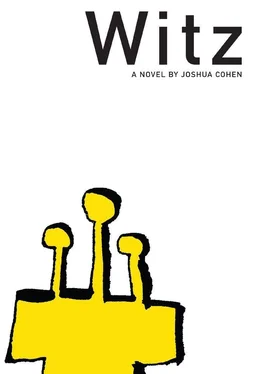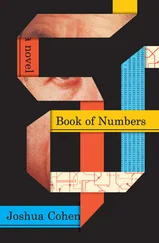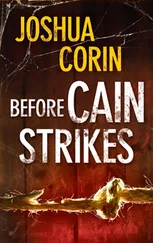And so Rubina — the eldest, the firstborn who’s fragile yet never much worried about, though still a girl, though still a daughter and without any privilege, without an exemption, upstairs folding her wardrobe, fluffing her seniority, her pillows and hair — she’s often known as Simone, the secondborn, though Simone is less Rubina than she is Livia, the thirdborn, who’s sometimes Si and at other times Judy, Hanna insists Judith, the fourthborn, and reverse that (Judy/Liv), or Batya (still the youngest, if often forgotten), and also Isa, the fifthborn, Isa from Isabella Hanna again has to insist, known mostly as Is — just like Israel her father she takes after, and so at least he should remember, though he doesn’t, not much — though to him Isa is occasionally Zeba, the sixthborn and so one of two middlekinder, as Isa or Is is usually poorly behaved — there’s never just one of them crying over a mistaken identity, the milk of her personality spilled — and Zeba’s only occasionally (poorly behaved), Zeb who’s sometimes Dina, the seventhborn and so the other of two middlekinder, who herself is sometimes Isa, and Natalia, the eigthborn, who is occasionally Dina, though Di is never Nat as she’s known who’s often also taken for Gill, the ninthborn, short for Gillian, who’s often Isa who herself ’s often Asa, the tenthborn, easy enough to make that mistake, and reverse that (As/Is), Gillian who’s often Jo, from Josephine, the eleventhborn, while Rubina, Simone, Liv, Judith, Isabella, and Zeba are all sometimes Batya, if seldomly, the last so far and the twelfth, though Batya’s never anyone else with the exception of Josephine then reverse that, and anyway Batya’s more often called Bat, but most often B or Be. As in Must you Be so annoying, so demanding, so loud and insistent why don’t you just go sit on the couch of the sofa and cry your way through a last show on teevee, a toy, play a game by yourself with yourself, any joy, count the cushions, which are islands, don’t you know, and must be kept separate from the pillowy clouds that require your enumeration as well. How many fingers, must you Be so difficult, how many toes. That is, whenever anyone decides to talk with her, to talk to her or even of her, orders and rules, which is hardly ever as she can herself barely speak. Who even knows if she knows her own name.
Daughters of Hanna — and daughters of Israel, too, who maybe wished some might’ve been sons.
He sits in judgment of himself atop his intersection when and where there’s still light. Skyscraping, Midtown. Not much longer. In a chair at his desk, one arm behind his head, the other over his mouth, stroking his beard, going gray to become white, the arch of his moustache, or yawning — tired, he’s always tired, he never sleeps, never gets to sleep, despite the pills, despite the wine and pills, despite his liver; strokes the remnants of his illadvised, inevitably late linner to the floor, the lunch of his dinner he flicks its rye’s crusts, crumbs, and seeds to the rich rug stretching out above the parquet slick, kept exceedingly mopped with what seems to be gribnes, or schmaltz — one day, his fear, he’ll slip and fall, his hip, his broken back, he’ll sue; might as well begin billing himself for the case, he thinks, sucks the seltzer from his moustache, withholds a weakling fart.
Tilting his chair, he props his wingtips up on the desk, stretches himself out, then pulls himself back in, fetally small, knees to lips.
Then pushes out again, tilts back the chair, feet up on his desk, then again.
This is work, if he has to explain it to them, his wife, his kinder, he throws up his hands and tells them, what I do. This is what I do to put a roof over your heads, food on your plates. What. I. Do. This is working as a lawyer for any plaintiff who could afford him. To think, those who do would make for better defendants. A caseload such as you wouldn’t believe. What he puts up with, what he hears, and what he says, too, every day, same old. Tell it to the judge who’s a friend.
His plaint: this waiting, this wasting of the last hour of the last day of the second to last week of the year, the last day of the last workweek he’s working this year. Winter, the sun to set upon early, foreshortened days. He’ll be late. To apologize, make up to them for his irresponsibility, the traffic, the weather. In his family, Israel’s often the defendant. His daughters the jury. With Hanna as counsel, he could do worse for representation.
The office is purging itself, up from the guts of the subterranean parkinggarage, with everyone off to their own — it’s almost Xmas, the holiday all the receptionists, secretaries, and paralegals observe…and a Merry Merry to you, too, to you and yours from me and mine and all of us here at Goldenberg, Goldenberg, & Israelien. With the support staff gone all next week, everyone else takes off — if not for their secretaries, what would get done? Cups without coffee. Briefs long blank. File the lack of an alphabet.
He searches his small office refrigerator — as empty as it’d been gifted to him, by friends of the family, after wasting an afternoon fixing a speeding ticket, assault more like an unfortunate misunderstanding for their son, a classmate of Rubina’s. At least it’s plugged in. Amid the silence, the thing cantors low.
It’s not that he’s still hungry or thirsty — after that sandwich too late, and this with Shabbos stuffed in the oven of home — it’s something else, something different: the refrigerator’s new magnet, TGIF it acronyms THANK GOD IT’S…his secretary, Hanna, no, Lorna, no — wait, he’ll find it, he’d scribbled it down once on the back of a businesscard, just in case — her name’s Loreta, yes, Loreta she’s always picking these magnets up wherever she shops, who knows, his wife’s habit, too, just as bad.
Nothing left to do, nothing expected of him until the Monday after this Monday expected, there’s no reason he’s here, no excuse, he should go home, his wife’s pregnant, expecting any breath, any any, but he won’t, if it’s expectations we’re talking, how he doesn’t, he stays, he works late; wraps a rubberband around his fingers as if in the hand of phylacteries, Shadai, holds a paperweight in the rubberband, tugs to tension, lets go, with the rubberband as a sling today’s paperweight’s hurled across desk, floor, office, through the air, misses the trash — a David he’s not. Around the trash are scattered months of paperweights, all the same model, moonily lucent and round — his secretary’s always picking these up for him whenever she goes on vacation wherever she goes, Loreta, he’ll remember it now: this specimen like the others says MIAMI across the top and he hates Miami, that he’ll never forget, that’s where his father lives, where his mother did, too, but his father; my daughters won’t grow up to marry like that, so he says, my daughters’ll never grow up. Holes in the wall where he’d overshot the trash, when the paperweights’d hit plaster, insulation, embedded.
It’s just around that time for Maintenance, the sanitation engineers due to slink in, dragging with them their pails and mops: he always avoids their eyes on his way out, reddened, sloshy, inflamed with powdered soaps, disinfectant sprays, it’s too terrible — how in their blindness, you see how you’re cleansed. A flesh hunched into woman stops at the door, smiles lone tooth, thumbs at his trash. He nods, she lifts it to dump into her trash kept on wheels.
TGIF. MIAMI. M.y I. A.ches M.y I, why these stupid diversions. Paperweights, there are none in his trash.
Wasting in his office, waiting for the Voice — amid the wilderness of petty dispute, for a test, a message garbled with grace, anything pressingly Urgent, requiring Attention whether immediate in action or reflective in referral and thought, anything to keep him in re: here, and so to keep him away from there, preemptive prophecy rescheduling Them. Home. And a goodnight to the window scheduled to his face. Merry Xmas. Nu, to you, too, take it easy…as he orders his work, shuffles paper, clips, throws all to a drawer of the stomach. Soon, his desk’s empty except for the calendrical blotter, his planner, which is showing two months and this month, the months prior and next shown smaller than this, shrunk, the past inked in with slashes. Fingers stained have marked with dark the month foretold at lower right. A moon revolves around the days of his planner, bleeds through boxes of weeks, wax to wane, fulling and renewing itself.
Читать дальше












